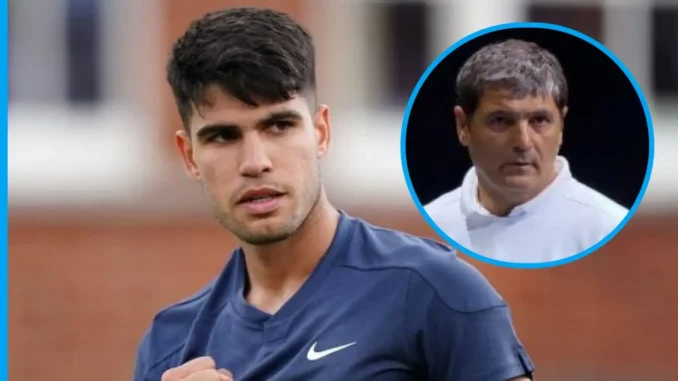
Carlos Alcaraz, the 22-year-old Spanish tennis prodigy, has been riding a wave of success as he defends his French Open title at Roland Garros in 2025, powering into the quarterfinals with a hard-fought victory over American Ben Shelton. Yet, off the court, a pointed remark from Toni Nadal, the legendary coach and uncle of Rafael Nadal, has sparked intense discussion about the young star’s future. In a candid interview on the Nude Project podcast, Toni issued a stark warning to Alcaraz: if tennis ever becomes too overwhelming, he should consider walking away from the sport entirely. “If it overwhelms him, then he should quit tennis,” Toni declared, addressing Alcaraz’s recent reflections on the pressures of his meteoric rise. This bold statement has sent ripples through the tennis community, igniting debates about sacrifice, mental health, and the demands of elite competition.
Alcaraz’s openness about his struggles came to light in the Netflix documentary *Carlos Alcaraz: My Way*, released in April 2025, which offered an unfiltered look at his 2024 season, including his Wimbledon and French Open triumphs. In the series, the world No. 2 revealed a vulnerability rarely seen in athletes of his caliber. “Right now my biggest fear of all is ending up seeing tennis as an obligation,” he confessed. “Sometimes I feel like I am enslaved to tennis and that causes anxiety, frustration, doubts.” These words, raw and introspective, painted a picture of a young champion grappling with the weight of expectations, a relentless schedule, and the challenge of balancing his passion for the game with a desire for a normal life. After a second-round loss to Gael Monfils at the Cincinnati Open in 2024, Alcaraz admitted to smashing his racket in frustration, saying, “The fact of the matter is, I wasn’t mentally strong enough to overcome all the stress.”
Toni Nadal, who coached Rafael Nadal to 16 of his 22 Grand Slam titles, responded with characteristic directness, admitting he hadn’t watched the documentary but felt compelled to address Alcaraz’s mindset. “I understand things differently in life,” he said. “In the end, in the world of sport there is a tendency to exaggerate everything.” Toni challenged the notion of sacrifice in sports, dismissing it as an overblown narrative. He recalled hearing similar complaints about the “sacrifices” of Real Madrid athletes and countered, “Sacrifice? Life is about giving up things, not just doing what I want.” For Toni, the rewards of Alcaraz’s career—significant earnings, global recognition, and unique experiences—far outweigh the costs. “Alcaraz, as a great tennis player, does indeed pay a price,” he acknowledged. “But on the other hand, he earns much more money than the vast majority of young people his age, enjoys far greater social recognition, and experiences things few people ever do… If it doesn’t pay off, it’s better to make a decision.”
This perspective reflects Toni’s old-school philosophy, forged through decades of coaching Rafael Nadal, whose relentless work ethic and mental fortitude defined his 20-year career. Toni recounted a lighthearted memory of a young Rafael playing pinball in France while his peers were stuck in math class, emphasizing the joy and privilege that a tennis career can bring. “Rafael was happy when he played tennis,” he insisted, suggesting that Alcaraz should embrace the challenges rather than dwell on the burdens. “I hope Alcaraz doesn’t change, because he’s one of the best in the world, but he must rise to the challenge,” Toni added, urging the young Spaniard to accept the sacrifices inherent in pursuing greatness.
Alcaraz’s candor about his mental health has earned praise from commentators like Andy Roddick and Boris Becker, who commend his willingness to address issues often taboo in professional sports. His advocacy for players’ welfare, including his support for Sara Sorribes Tormo’s 2025 decision to take a break and his involvement in a letter demanding better revenue distribution from Grand Slams, underscores his broader commitment to the sport’s future. Yet, Toni’s remarks highlight a generational divide in how sacrifice and success are perceived. While Alcaraz navigates the pressures of being compared to his idol Rafael Nadal—whom he joined in doubles at the 2024 Paris Olympics and celebrated during Nadal’s emotional Davis Cup farewell in November 2024—Toni’s advice serves as a reminder of the resilience required to stay at the top.
As Alcaraz prepares for his French Open quarterfinal against Tommy Paul, his on-court brilliance remains undeniable. His explosive forehand, deceptive drop shots, and unmatched athleticism have drawn comparisons to Nadal, Djokovic, and Federer, with the latter noting that Alcaraz combines “the best of all three worlds.” However, Toni’s words linger as a challenge: can Alcaraz find joy in the grind, as Rafael did, or will the weight of expectation force a reckoning? For now, the tennis world watches, hoping the young Spaniard continues to dazzle while navigating the complex balance between ambition and well-being.
Leave a Reply